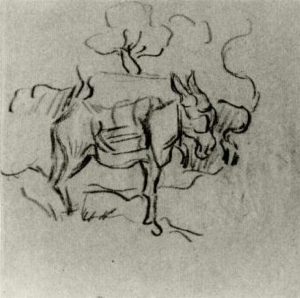Arkiv, Høytlesning
Desert Fathers 36
Abba Antony heard of a young monk who had performed a wondrous sign on the road. Having seen two elders travelling and suffering hardship on the road, he had commanded donkeys to come and carry them until they would reach him. It was the two elders themselves who told Antony about this. He said to them: ‘This monk seems to me like a ship full of all sorts of goods, but I am not sure it will reach the harbour.’ Then, after some time had passed, Abba Antony all of a sudden began to weep and pull out his hair and lament. His disciples asked him: ‘Abba, why are you weeping?’ The elder said: ‘A great pillar of the Church has fallen now.’ He was referring to the young monk. ‘But go and see him’, he said, ‘to find out what has happened.’ So the disciples went off and found the monk sitting on his rush mat bewailing the sin he had committed. When he saw the elder’s disciples, he said to them: ‘Tell the elder to beseech God that he might give me just ten days to prepare my defence and repent.’ Within five days he was dead.
Much is implicit in this story. Two old monks are on their way to visit a younger monk for some reason. The younger monk realised (whether by means of a vision or some other form of insight) that the travellers were struggling, wearied by fatigue and heat and dust. He commandeered a couple of donkeys to go and meet them, a considerate act. It lets us see that he was well advanced in spiritual life: not only had he faculties to pick up what was going on at a distance; he had, like unfallen Adam, a ready understanding with the animal kingdom, a motif regularly used in the desert literature to show that a particular person is being restored to know humanity’s prelapsarian potential.
All this is admirable and edifying, showing grace at work. The young monk, however, blew it. When the elders arrived and told him, we can imagine with what rapture, of the obliging donkeys, their host just could not help letting slip, ‘Oh yes, I know — that was me.’ The elders, pure-hearted men, no doubt, thought nothing of this remark. They were just amazed by what had happened. Not so Antony, that incomparable knower of the ruses with which earnest friends of God are confronted. When the old fellows told him their story he said about the donkey-whisperer, genially but shrewdly, that he was ‘like a ship full of all sorts of goods’ — a man, that is, singularly gifted and graced. Would that ship, though, reach the shore? Antony had doubts. The young monk’s penchant for vainglory made him vulnerable to sudden crashes with icebergs.
Such a one duly occurred. This time it is Antony’s turn to intuit something going on at a distance. Notice his immediate, sharp distress. He starts to act extravagantly, like a prophet of old, shedding tears and wailing while pulling out his hair. When his disciples ask what troubles him so he provides them with a telling image: ‘A great pillar of the Church has fallen now.’ Earlier he had spoken of the charismatic youngster as a ship ploughing the sea, a joyous, dynamic turn of phrase. Now he calls him a fallen pillar, calling to mind the dilapidation of which Egypt, home to the ruins of many a grandiose scheme, was full: Antony, remember, had squatted for years in a derelict fort.
When Antony’s disciples go to find out what had happened, they find the young man caught in the sort of predicament Antony had foretold, the kind that causes ships with precious cargo to sink. Wherein his fall consisted we do not know. That does not matter. We can imagine its species. Vanity seduces us to think we are beyond certain kinds of temptations, particularly those that haunt newcomers to the spiritual life: the ones that lure us sensually, a stage the self-avowed mystic is sure to have passed well beyond. The assumption is foolish.
If there is one thing that strikes us to the point of nausea when we consider famous, once highly esteemed spiritual teachers and founders who, within living memory, have come tumbling down from their pedestals, is it not precisely the lurid nature of their betrayals? Again and again we have found men and women who for decades had spoken sublimely, spurring others on to the pursuit of perfection, caught in webs of tawdry reliance on creature comforts, money, affective manipulation, even sexual abuse. Sometimes these people have been conscious of living a lie. Sometimes they have been unfit to see the contradiction, as if their constructed status as elect persons had placed them beyond normal human and Christian norms.
The young man in the story is not like this. He repents. Foremost in his mind is the thought of God’s judgement, which awaits him. He implores Antony to pray that he might be given sufficient time ‘to prepare his defence’, a possible rendering of a Greek verb constructed on the noun apologia, not necessarily a self-justification, but a placing of a given course of action in context, in order that it might be better understood, perhaps more mercifully judged. The young man asks for ten days to get ready. After five he dies. This lets us presume that his repentance was effective, making him ready to confront his Maker.
It will help us steer a straight course past certain alluring Siren calls if we recall that we shall confront him, too.

